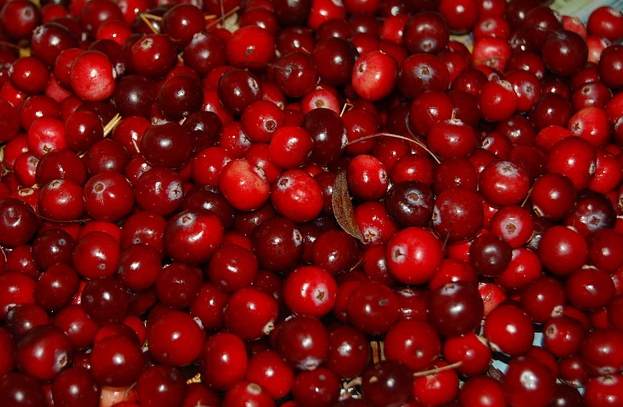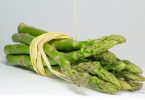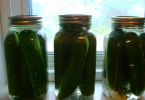Today’s question: can dogs eat cranberries? Are cranberries good or bad for dogs? Scroll down for detailed answers.
Cranberries have a reputation as being a very tart type of berry, very small in stature, and also very red. The cranberry is grown easily and in many backyards, making the berry easily accessible, relatively low cost, and very useful in recipes. Whether the cranberry is used in a bread or muffin, as a spread or jam, in a drink, or popped into the mouth as-is, the cranberry is an easy addition to most any diets.
The benefits of cranberries are many. The berry is low calorie, low sugar, full of antioxidants and random vitamins and minerals, while also aiding in hydration. Besides the fact that they have a delicious taste, cranberries are also good for treating urinary tract infections. The cranberry may be most known as a homeopathic remedy for urinary tract infections. Well, at least for humans. However, can this principle be applied to dogs as well? Many natural methods of healing that affect humans may also affect dogs.
Can dogs eat cranberries or would it be better to leave that delicacy aside? Many times we may think offering a particular food is good for your pet and will cause no harm, but do we really know? How many people really look into the type of food offered to their pets as treats and supplements?
If you are a dog owner and have wondered whether you should, or should not give your pet cranberries, we are here to provide all the answers. Keep on reading and you will find out everything there is to know about this subject.
Can Dogs Eat Cranberries?
Cranberries are not recommended for dogs. Dogs have hard time digesting raw cranberries and it may lead to upset stomach. Raw foods are best for humans to eat, in order for us to absorb all of the vitamins and minerals within the fruit. However, for dogs, a raw cranberry may not be soft enough to eat, but hard enough where an un-chewed berry will go right down the throat-much like a small marble.
When inhaled, the berry goes straight down the throat, into the stomach, where the berry will remain undigested until moved along at a later date. While waiting for the berry to digest, a dog may have pain, gas, and discomfort, which leads to unpleasant expelling of the waste.
Cranberries themselves are not good for dogs to eat; however, you can give cranberry juice to your pet occasionally. Just make sure to buy the variety that does not have any added sugars or preservatives. Excess sugar is not healthy for dogs. One way to offer cranberry juice that is low in sugar is to dilute the juice with water. Your dog will still have the taste, hydration, and possible urinary tract benefits (if needed) but without the sugar and calories. The juice will got through the system easier and smoother than an actual berry and be less of a risk.
Cranberry juice helps to cure UTI. If your dog has urinary tract troubles, you can try to give him some cranberry juice. This way, the amount of bacteria in the urinary tract will be brought to a normal level. However, cranberry juice is pretty bitter and you may have a hard time making your pooch to drink it. Diluting the juice with water may help you dog choose to drink the juice without much a fight from you.
Cranberries may also possibly treat stomach ulcers. However, more research needs to be done to confirm this interesting form of health benefit. Stomach ulcers are frequently associated to over-linking and overgrowth of one specific type of stomach bacteria called Helicobacter pylori to the stomach lining. Correspondingly, like cranberries help prevent bacterial attachment to the urinary tract lining; they may also aid to prevent the bacteria to connect to the stomach lining. There are already some studies done that showed evidence of cranberries help save us from stomach ulcer in this way.
How to Identify UTI
If you suspect that your dog has a urinary tract infection, write down all the symptoms you observe rather than trying to cure him with home treatments. When your list is done, it’s best to consult with the vet to get the accurate diagnosis. If your dog, indeed, suffers from a urinary tract infection, the vet will prescribe the right medication. You may choose to offer cranberry juice while awaiting a diagnosis and medication. The juice may help with some of the pain and give your dog a head start on healing.
Always remember that an unpleasant urinary tract infection may only be cured with antibiotics. Cranberries and the juice may aid in natural healing and comfort, but medicine is needed to kill the source of the infection. However, for prevention of your pet’s recurring urinary issues, you may want to try cranberry supplements. As with all supplements and medications, consult the veterinarian before feeding cranberries in any form to your pooch.
Health Benefits of Pure Cranberry Juice
Cranberries are rich in antioxidants, particularly proanthocyanidins. These anitooxidants are accountable for their vibrant color. Antioxidants defeat free radicals, which damage DNA and may lead to cancer, heart disease, and many other diseases. Anti oxidants are important to everyone’s health and well being, whether human or dog. Foods with anti oxidants also seem to be pleasurable to eat, look at, and bake with due to their color and sweet tastes.
A study showed that cranberry juice increases high-density lipoprotein (the good cholesterol) which assists with heart health. Cranberries are high in flavonoids, which can promote circulation and help prevent heart disease. Moreover, the phenols in cranberries may aid in preventing blood clots formation. Dog owners may not realize how closely their pet’s health can mirror their own. Dogs are able to develop heart disease, blood clots, and infections just as their owners. Those with a poor diet are more susceptible to developing these diseases. Owners, who are aware of their own health and the vitamins needed to sustain it, may be more willing and able to provide for their own pet’s health. Adding cranberry juice to bolster the circulation of a dog is bound to have wellness benefits overall.
Another hidden fact on the cranberry is that cranberry juice may also prevent periodontal disease. The juice stops oral bacteria from sticking to the teeth through the same process that promotes urinary tract health. Dental health is often overlooked on dogs, but their tooth and gum health is just as important as our own. The dental health of a dog often represents the overall health of the dog, and a poorly cared for mouth may lead a number of other problems. On the other hand, caring for the teeth and using cranberry juice to prevent periodontal disease may work in your favor and aid in the dental habits of your pup.
Cranberries contain anti-cancer properties. The phytochemicals in cranberries may help prevent many cancer types, such as the occurrence of breast, lung, colon, prostate and other tumors. However, more studies need to be done on these subjects. If there were a cure for cancer, or a preventative, there may be an invention for this already. Since there is not a cure for cancer, many cling to the idea of natural remedies that slow the rate of cancer or percent the disease all together. While this seems like a good idea and scientific based, the only true source of an answer would be from your vet. However, there is nothing to say cranberry will ‘cause’ cancer either.
Can Dogs Eat Dried Cranberries?
Unlike other fruits such as oranges, apples or bananas – cranberries are not so popular. Fruits may be eaten any number of ways, but in the realm of dried fruits, cranberries are often chosen in this arena rather than in the raw and fresh from the bush type of berry. Dried fruits tend to me more portable, easier to eat, a bit less sweet, and less messy and juicy than their counterparts. Many people enjoy eating dried cranberries as a snack between meals and they might even take into consideration giving them to their dog. Dried fruit resembles biscuits in some ways, maybe even kibble with their round, dry, crispy shape. Are dried cranberries that different from traditional dog food?
While this train of thought may lead one to believe dried cranberries are perfect for their pooch, dried cranberries are also not recommended for dogs. The fruit will take on other characteristics and will contain preservatives and added sugars once it has been dried. Also, commercially dried cranberries substantially contain decreased amounts of vitamins A and C. The nutrient density is also reduced if sugar is added. Eating dried cranberries will supply very little quantities of minerals and vitamins. They simply would not add any value to your dog’s meal; rather they might cause diarrhea or stomach problems, so it is not recommended to feed them to your pooch. Just as regular cranberries should be avoided due to sugar content and inability to chew, the dries counterpart should also be avoided. The risk of chemicals, sugars, and lack of vitamins and actual nutrition far outweighs the need to pop a cranberry in your dogs mouth.
Taking Care of Your Dog’s Health
We all want what’s best for our canine friends. This is why we should take the time to make the proper research and decide what food is better for their health and what is not.
Dogs may certainly try to eat cranberries out of curiosity but these berries are not a good option for them. As mentioned earlier, the cranberry juice is the most recommended option.
Related articles:
References:
http://www.pedigree.com/all-things-dog/article-library/can-cranberries-cure-canine-troubles.aspx
http://canigivemydog.com/cranberries
https://en.wikipedia.org/wiki/Dried_cranberry
http://www.whfoods.com/genpage.php?tname=foodspice&dbid=145
http://www.livestrong.com/article/277392-what-are-the-benefits-of-pure-cranberry-juice/








Many 100% cranberry juices flavors are sweetened with grape juice. Grapes are on the “no” list for dogs.